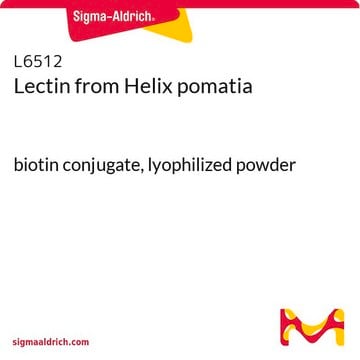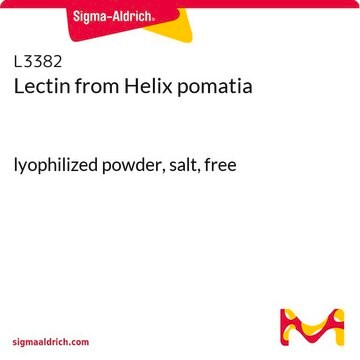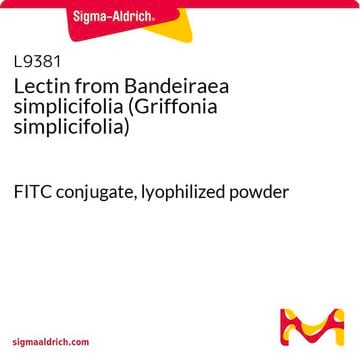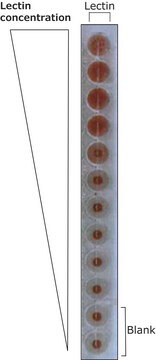Wszystkie zdjęcia(1)
Kluczowe dokumenty
L3759
Lectin from Bandeiraea simplicifolia (Griffonia simplicifolia)
biotin conjugate, lyophilized powder
Synonim(y):
Bandeirea simplicifolia agglutinin, BS-I
Zaloguj sięWyświetlanie cen organizacyjnych i kontraktowych
About This Item
Kod UNSPSC:
12352200
NACRES:
NA.32
Polecane produkty
białko sprzężone
biotin conjugate
Formularz
lyophilized powder
siła działania
<250 μg per mL agglutination activity (using human blood group A erythrocytes.)
skład
Protein, ~85% E1%/280
zakres etykietowania
~5 mol biotin per mol protein
temp. przechowywania
2-8°C
Szukasz podobnych produktów? Odwiedź Przewodnik dotyczący porównywania produktów
Zastosowanie
Lectin from Bandeiraea simplicifolia (Griffonia simplicifolia) has been used:
- for highlighting murine endothelial cells
- to identify fetal capillaries in endothelial immunohistochemical staining, conjugated with biotin
- to detect tumor total vessels
Działania biochem./fizjol.
BS-I has a major affinity for terminal α-D-galactosyl residues with a secondary affinity for terminal N-acetyl-α-D-galactosaminyl residues.
Inne uwagi
BS-I is a tetrameric lectin consisting of two types of subunits designated A and B. There are five BS-I isolectins with different subunit composition: BSI-B4, BSI-AB3, BSI-A2B2, BSI-A3B and BSI-A4. BSI-B4 is blood group B specific and has an exclusive affinity for terminal α-D-galactosyl residues, whereas BSI-A4 has blood group A specificity and has a major affinity for terminal N-acetyl-α-D-galactosaminyl residues.
Postać fizyczna
Contains sodium citrate
Komentarz do analizy
Agglutination activity is expressed in μg/mL and is determined from serial dilutions of a 1 mg/mL solution using phosphate buffered saline, pH 6.8, containing, for each lectin, calcium, magnesium, and manganese at different concentrations. This activity is the lowest concentration to agglutinate a 2% suspension of appropriate erythrocytes after 1 hr incubation at 25 °C.
Ta strona może zawierać tekst przetłumaczony maszynowo.
Kod klasy składowania
13 - Non Combustible Solids
Klasa zagrożenia wodnego (WGK)
WGK 3
Temperatura zapłonu (°F)
Not applicable
Temperatura zapłonu (°C)
Not applicable
Środki ochrony indywidualnej
Eyeshields, Gloves, type N95 (US)
Wybierz jedną z najnowszych wersji:
Masz już ten produkt?
Dokumenty związane z niedawno zakupionymi produktami zostały zamieszczone w Bibliotece dokumentów.
Klienci oglądali również te produkty
Laura Schaad et al.
Scientific reports, 7, 41842-41842 (2017-02-09)
A detailed vascular visualization and adequate quantification is essential for the proper assessment of novel angiomodulating strategies. Here, we introduce an ex vivo micro-computed tomography (microCT)-based imaging approach for the 3D visualization of the entire vasculature down to the capillary
Intravitreal and subconjunctival melphalan for retinoblastoma in transgenic mice
Shah NV, et al.
Journal of Ophthalmology, 2014 (2014)
Yun Sook Kim et al.
The Journal of comparative neurology, 518(5), 687-698 (2009-12-25)
Transient receptor potential ankyrin 1 (TRPA1), responding to noxious cold and pungent compounds, is implicated in the mediation of nociception, but little is known about the processing of the TRPA1-mediated nociceptive information within the trigeminal sensory nuclei (TSN) and the
Merle M Krebber et al.
Journal of hypertension, 38(3), 489-503 (2019-10-28)
Left ventricular (LV) hypertrophy is the most common cardiac alteration in patients with chronic kidney disease (CKD). Normalization of hypertension in CKD patients receiving a healthy kidney allograft often reverses LV hypertrophy, but effects on LV fibrosis remain unclear. To
Suppressive effect of 2, 3, 7, 8-tetrachlorodibenzo-p-dioxin on vascular remodeling that takes place in the normal labyrinth zone of rat placenta during late gestation
Ishimura R, et al.
Toxicological Sciences, 91(1), 265-274 (2006)
Nasz zespół naukowców ma doświadczenie we wszystkich obszarach badań, w tym w naukach przyrodniczych, materiałoznawstwie, syntezie chemicznej, chromatografii, analityce i wielu innych dziedzinach.
Skontaktuj się z zespołem ds. pomocy technicznej










